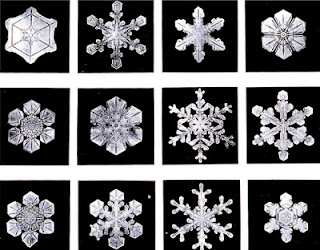Julith Jedamus' "In Memory of the Photographer Wilson 'Snowflake' Bentley..."
How right that a poem about perfection is nearly perfect! The strongest poem in the book, to my mind, is written “In Memory of the Photographer Wilson ‘Snowflake’ Bentley, Who Died of Pneumonia after Walking through a Blizzard Near Jericho, Vermont, December 23, 1931.” It is about a man killed by the perfect beauty that he sought.
Composed in
lines of three strong beats and in terza rima, with its unavoidable
associations with hell, purgatory and heaven, the poem consists of six
sentences. Three and its multiples govern this poem.
The first
sentence describes the beauty of snowflakes, the subject of Bentley’s
photography.
Beauty was,
for him, cold,
hexagonal,
perfect
in all its
parts, beheld
once and
once only.
Just as a
snowflake is hexagonal, the poem has six sides or sentences. The idea of
“parts” supports the listing of Beauty’s qualities, a device that is over-used
elsewhere in the book, but is justified by its subject here.
The second
sentence inverts the syntactical order of the first by listing the qualities
first before naming “his flakes” as the subject of the sentence: “Locked/
beneath his lens,/ light-spun/ and light-refracting, flecked/ with coal dust
and pollen.” This sentence focuses on the beauty captured by Bentley’s lens. As
such, the lines are highly musical, the liquid l’s lilting and light-footed,
the d’s and n’s exercising a delicate hold on the flow. Appropriately, after so much light, set
off by the dark flecks of coal dust and pollen, the snowflakes “shone with
lunar/ loveliness.” The expression gives the snowflakes an unearthly beauty.
All the foregoing l’s and n’s concentrate in the final phrase “lunar
loveliness.”
An ellipsis
brings the reader back to the present when we can see Bentley’s old prints. The
enjambment here is particularly cunning. The stanza enjambment after “And we
can” throws a huge stop on “see,” also set off by caesura. The line enjambment
after “these hundred-year-“ puts “old prints, plain evidence” in the same line,
thus equating “old” and “plain.” “Prints” and “evidence,” the poem’s synonyms,
share sonic sympathies. What we can see in the old prints is evidence of
Bentley’s qualities, also given in a list: “attention,” “care” and “chilling
confidence.” Furthermore we can also see in the old prints certain aspects of
“the manifold world”: “its willed evanescence,” “its subtle signs” and “wild
and blinding storms.” Three aspects of the world to match the three qualities
of the photographer. “Willed” in “willed evanescence” is interesting. Who is
doing the willing? The snowflakes or some bigger force willing the snowflake to
be evanescent? In human terms, when Bentley walked through the blizzard that
killed him, did he will his death or did some higher power will it?
“Evanescence”
and “storms” provoke the next, and fourth, sentence, a question mimetic of
surprise, “Did it/ surprise him, to be killed// by a surfeit of white…?” Then
follows a brilliant description of a blizzard. It was, counter-intuitively, “a
blazing increment,” the last word also bringing up its ghost, “inclement.” It
was a bewildering mix of “stars, ferns, wands and bright/ escutcheons,” of
things belonging to the sky and to the earth; of weapons of attack and of means
of defence. The blizzard was “an argent/ army of perfectness.” The army was
both clad in silver armor and wielding silver weapons. “Argent” also brings up
its ghost, “ardent.” A cold fury. And why “perfectness” instead of the more
usual “perfection”? It’s there for the rhyme, but, more importantly, it raises
its peer, “highness.” This army is royal. It belongs to the King, to be exact,
the King of Kings.
The fifth
sentence commands the reader to “Look,” not at a snowflake any more but at
Wilson “Snowflake” Bentley, and see, in the final list of the poem, “his
wind-bent// back, his boots caked with ice,/ his glazed eyes.” The poem directs
its lens from his back to his boots and then zooms in on his eyes. We will see
his eyes as he once saw his snowflakes, with attention, care and chilling
confidence.
Then a
second ellipsis, balancing the first, sends the reader back to the past, into
Bentley’s mind. The last sentence of the poem is a question-within-a-question.
Did
he have,
in his last
seditious
delirium,
one brave
black
thought: did God murder
us all with
too much love?
The delirium
is “seditious” because he is struggling against a royal army. In his delirious
state, his mind makes a wild leap from storm to God. Just as the snowflakes
were flecked with “coal dust and pollen,” this human snowflake is darkened by
his last “black thought.”
But … is the
insistence on “too much love” too much? We already know the love, as symbolized
by the blizzard, is too much since the storm is “a surfeit of white.” Also,
“murder” does not rhyme with the initial pair of rhymes at the beginning of the
poem, “cold” and “beheld.” God, however, does rhyme. Wouldn’t the poem have
ended more perfectly if it ends: “did God/ murder us with love?”
True, true,
but the poem wouldn’t have ended by being nearly perfect, would it? It wouldn’t
have been a snowflake flecked with coal dust and pollen.


Comments